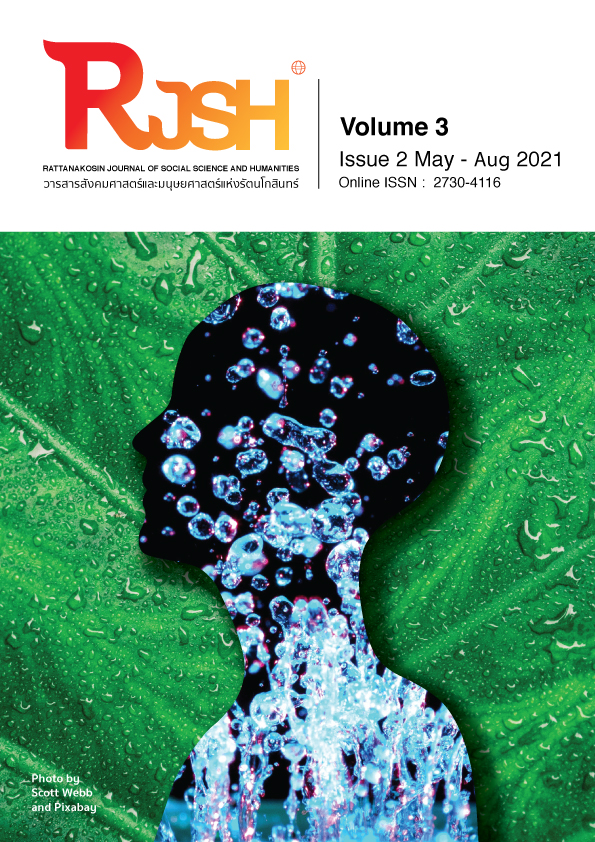Assessment of Recyclable Waste Amount for Local Municipal Solid Waste Management: Case Study of Salaya Sub-District Municipality, Nakhon Pathom Province
Main Article Content
Abstract
This article presents the study related to the amount of recyclable waste from Salaya Sub-District Municipality. The information obtained from this study is used as a basis for planning an appropriate and most efficient waste management action. The study of solid waste management and the collection of recyclable waste disposal data of Salaya Sub-district Municipality is carried out from October to December 2018.
The results of the research were found that the total amount of recyclable waste collected was 21,289 kg. consisting of 7,061 kgs of clear plastic, 5,668 kgs of general plastic, 1,960 kgs of paper boxes, and 1,671 kgs of glass bottles with the percentage of 33%, 27%, 9%, and 8% respectively. As a result, the revenue gained from the sale of recyclable waste was 183,838 bahts and it could reduce the amount of landfill by 21.28 tons, and could reduce the cost of landfill waste by 194,478 bahts or 11.26% of the cost of landfill waste during October – December 2018.
Article Details
The content within the published articles, including images and tables, is copyrighted by Rajamangala University of Technology Rattanakosin. Any use of the article's content, text, ideas, images, or tables for commercial purposes in various formats requires permission from the journal's editorial board.
Rajamangala University of Technology Rattanakosin permits the use and dissemination of article files under the condition that proper attribution to the journal is provided and the content is not used for commercial purposes.
The opinions and views expressed in the articles are solely those of the respective authors and are not associated with Rajamangala University of Technology Rattanakosin or other faculty members in the university. The authors bear full responsibility for the content of their articles, including any errors, and are responsible for the content and editorial review. The editorial board is not responsible for the content or views expressed in the articles.
References
ปาลิกา วรรณวิไล. (2559). การวิเคราะห์การจัดการขยะมูลฝอยและยุทธศาสตร์สำหรับกรุงเทพมหานคร. วิทยานิพนธ์วิทยาศาสตรมหาบัณฑิต, สถาบันบัณฑิตพัฒนบริหารศาสตร์
พีรยา วัชโรทัย. (2556). การจัดการขยะขององค์กรปกครองส่วนท้องถิ่น: กรณีศึกษาเทศบาลตำบลเมืองแกลงจังหวัดระยอง. สถาบันบัณฑิตพัฒนาบริหารศาสตร์, วิทยาศาสตรมหาบัณฑิต.
ภัทรภร ศิลปเจริญ. (2562). การจัดการขยะอันตรายจากชุมชน กรณีศึกษา เทศบาลนครนครปฐม, วิทยานิพนธ์ศิลปศาสตรมหาบัณฑิต, มหาวิทยาลัยศิลปากร.
มงคลกร ศรีวิชัย, ปาริชาติ วงค์ฉายา และวรินทร์ เรืองศรี. (2563). การพัฒนาการจัดการขยะมูลฝอยชุมชนในพื้นที่ต้นแบบภายใต้ต้นแบบนักจัดการขยะ.วารสารวิชาการรับใช้สังคม มทร.ล้านนา, ปีที่ 4 (ฉบับที่ 1) หน้า 45-52.
ราชกิจจานุเบกษา. (2542). พระราชบัญญัติกำหนดแผนและขั้นตอนการกระจายอำนาจให้แก่องค์กรปกครองส่วนท้องถิ่น พ.ศ. 2542.
ราชกิจจานุเบกษา. (2557). ระเบียบสำนักนายกรัฐมนตรี ว่าด้วยการแก้ไขปัญหาขยะมูลฝอยในท้องที่จังหวัดนครปฐม จังหวัดปทุมธานี จังหวัดพระนครศรีอยธุยา จังหวัดลพบุรี จังหวัดสมุทรปราการ และจังหวัดชลบุรี พ.ศ. 2557.
ราชกิจจานุเบกษา. (2560). พระราชบัญญัติรักษาความสะอาดและความเป็นระเบียบเรียบร้อยของบ้านเมือง (ฉบับที่ 2) พ.ศ. 2560.
วิทยา ทัศนไพบูลย์. (2560). การพัฒนากลยุทธ์การบริหารจัดการขยะขององค์กรปกครองส่วนท้องถิ่น จังหวัดกำแพงเพชร. วิชาการเครือข่ายบัณฑิตศึกษามหาวิทยาลัยราชภัฏภาคเหนือ, 7(13), 67 - 81.
วีรกาล อุปนันท์. (2556). การศึกษาแนวทางการกำจัดขยะมูลฝอยแบบมีส่วนร่วมขององค์การบริหารส่วนตำบลโนนยอ อำเภอชุมพวง จังหวัดนครราชสีมา. วิทยานิพนธ์วิศวกรรมศาสตรมหาบัณฑิต, มหาวิทยาลัยสุรนารี .
เสาวลักษณ์ ศักดิ์สิทธิ์ และจุฑารัตน์ ชมพันธุ์. (2560, 10 มีนาคม). แนวทางการจัดการขยะมูลฝอยของจังหวัดปทุมธานี. การประชุมวิชาการเสนอผลงานวิจัยบัณฑิตศึกษา ระดับชาติและ นานาชาติ 2560, อาคารพจน์ สารสิน มหาวิทยาลัยขอนแก่น.
อนันต์ โพธิกุล. (2561). การบริหารจดัการขยะชุมชนของเทศบาลเมืองแสนสุข อำเภอศรีราชา จังหวัดชลบุรี. วิชาการสถาบันวิทยาการจัดการแห่งเอเชียแปซิฟิค สาขามนุษยศาสตร์และสังคมศาสตร์, 7(13), 107-121.
อัครพงศ์ อั้นทอง, ปเนต มโนมัยวิบูลย์ และ มิ่งสรรพ์ ขาวสะอาด. (2558). โครงสร้างวิสัยทัศน์ การขับเคลื่อนสุขภาวะและการจัดการทรัพยากรธรรมชาติและสิ่งแวดล้อมในท้องถิ่น. กรุงเทพฯ: สถาบันศึกษานโยบายสาธารณะ.
Panate Manomaivibool, Mongkonkorn Srivichai, Pattayaporn Unroj, & Pannipha Dokmaingam. (2018). Chiang Rai Zero Waste: Participatory action research to promote source separation in rural areas. Resources, Conservation and Recycling. 136(September), 142-152.
Pollution Control Department, Ministry of Natural Resources and Environment. (2019). Summary of the pollution situation in Thailand in 2019. Bangkok: Ministry.
Tawongma S, & Samati P. (2020). Solid Waste Management of Karen Hilltribe Communities in the Village Area for Security and Border Guard Villages Chiangmai. Boromarajonani College of Nursing, Uttaradit Journal, 12(1): 268-276.
The World Bank. (2018). WHAT A WASTE 2.0 A Global Snapshot of Solid Waste Management to 2050. Retrieved on April 2, 2021, from https://www.worldbank.org/en/news/infographic/2018/09/20/what-awaste-20-a-global-snapshot-of-solidwaste-management-to-2050.


